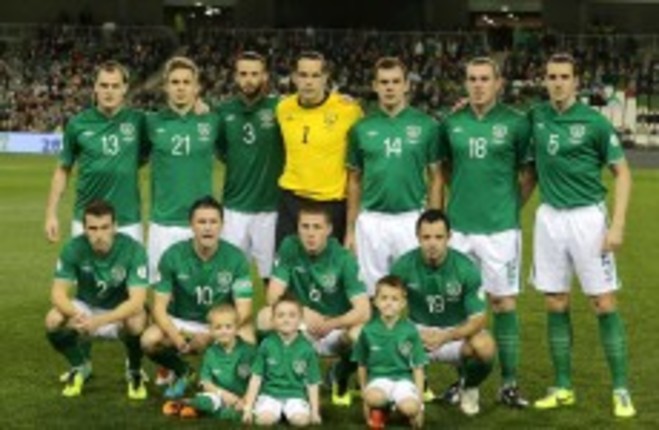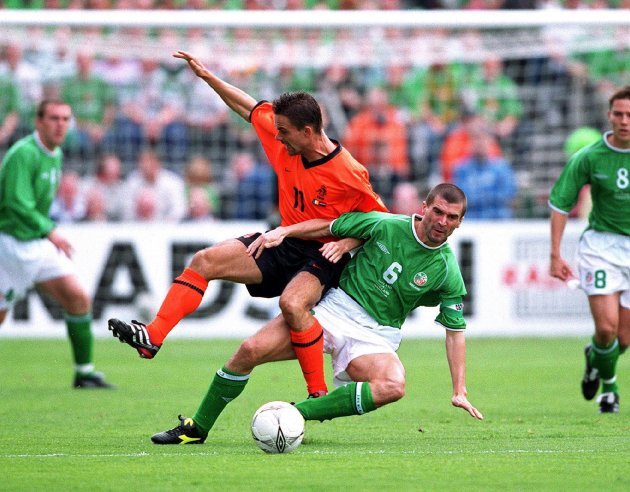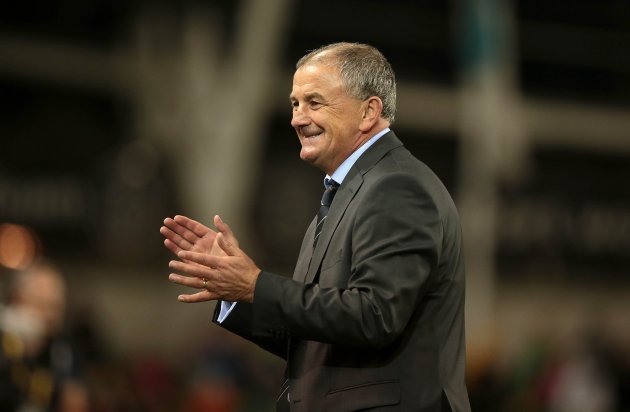SEASONED IRELAND FANS will remember it well. The 2002 World Cup was on the horizon. Ireland had been drawn in an extremely difficult group alongside Portugal and Holland. Few people gave them a chance of qualifying.
They faced a seemingly daunting trip to Amsterdam to play Holland in their first game of the campaign. Against the odds, they took a two-goal lead. Subsequently however, they made the fatal mistake of sitting deeper and deeper as the game wore on and ultimately, the match ended in a 2-2 draw.
Despite letting the lead slip, many Irish fans and players celebrated this result enthusiastically. Roy Keane, however, having been well accustomed to the high standards that come from playing at Manchester United, was noticeably disgusted. For the Irish captain, it had very much been a case of two points dropped rather than one gained, in spite of what many teammates, fans and critics thought.
Yet as was the case for much of his career, Keane seemed to somehow emerge from this disappointment even more determined than ever to prove the naysayers wrong and guide Ireland to the World Cup. He followed this match by inspiring his side to gain positive results against Cyprus, Portugal and Holland (in the return fixture). Commentators at the time agreed that it looked as if Keane was almost single-handedly dragging Ireland to the World Cup.
They did eventually qualify, of course, knocking out a footballing superpower — Holland — in the process. And at the time, media commentators speculated that this could be the start of a new era in Irish sport, in which deeply ingrained defeatist attitudes would be shed, and finally there would be a level of self-belief evident that had previously not existed. The same year as the Irish soccer side competed at the 2002 World Cup, the rugby team were encountering similarly impressive success, gaining their first victory over Australia since 1979. The emergence of talented youngsters such as Damien Duff and Robbie Keane suggested the soccer team could be a force to be reckoned with and added to overall feel-good factor surrounding Irish sport.
And indeed, that World Cup qualifier in which the Irish side improbably beat Holland 1-0 was to prove a watershed moment — just not of the type that many were expecting. Since then, in more than 10 years, Ireland have failed to beat a team placed higher than them in the FIFA rankings. So what went wrong?
Take a look at the Irish side that played Holland that famous day — Given, Gary Kelly, Dunne, Staunton, Harte, McAteer, Holland, Kilbane, Roy Keane, Robbie Keane, Duff. How many current players would make that side? There is surely at the very least a case to be made for Seamus Coleman, John O’Shea, Marc Wilson, Aiden McGeady, James McCarthy and Robbie Brady. Moreover, Keane and Dunne are veterans now whereas they were inexperienced youngsters back then, so it could be argued that they are at a more advanced level currently compared to 2001.
(Roy Keane, pictured tacking Marc Overmars during that famous 2001 encounter between Ireland and Holland — INPHO/Billy Stickland)
There is one big reason, though, why Ireland have failed more often than not since then, and it goes back to the essence of why Roy Keane felt so disillusioned following that Holland 2-2 game. Too often, the team has been prepared to accept mediocrity. Nowadays, whenever a draw is made for a particular tournament, the instant reaction is ‘we’ll settle for second’. When the Irish team was paired with Germany for the 2014 World Cup qualifiers, the talk did not turn to how the side could go about emulating that famous win over Holland. Instead, the consensus was that the German games were a write off — it seemed players had a better chance of winning the lottery than of competing with Joachim Low’s side.
Nowadays, the idea of an Ireland team being disappointed with a 2-2 draw against Holland seems laughable. Indeed — and there is an obvious link here — the very prospect of securing a draw with Holland in itself now sounds extremely fanciful.
Roy Keane — like all of the current Irish footballers — never had the skills of Xavi, Iniesta, Messi or other more naturally gifted players. Yet he led Manchester United to the European Cup regardless, through sheer willpower and self-belief. Keane was a world-class player — not because of his talent, which was limited enough, but because of his attitude. And similar attitudes, more than anything else, are sorely lacking within the current Irish set-up.
A little over 10 years after his refusal to celebrate the 2-2 draw with Holland, the type of stance Keane despised and often rallied against seems more prevalent than ever within the team. Trapattoni famously spoke in a contemptuous tone of how ‘we are Ireland’. In other words, we should be grateful at struggling to wins over Armenia and drawing at home with Bulgaria. Unlike most of Europe, he assumed the Irish players weren’t good enough to play a passing game — and players who thought otherwise, such as Reid and Hoolahan, were ostracised from the side indefinitely.
While there was a pretense of change when Noel King took over, in reality, he was abiding by Trap’s mantra — ‘we are Ireland, we don’t deserve any better’. Just over a decade after Keane and Amsterdam, the Irish side were unequivocally embracing the attitudes he fought so hard against.
Instead of the Manchester United man’s hyper-self-criticism, there is now almost an aversion to criticism — the wheel has come full circle. Now, as Noel King insists, we must celebrate and applaud 3-0 losses to Germany. Rather than objectively assessing a 3-1 win against Kazakhstan, we must unquestioningly rejoice at this outcome.
Speaking to reporters during the week, King even said that Ireland are “not dissimilar” to Kazakhstan. This statement gave a concise insight into how far standards have slipped since Keane’s relatively recent heyday. Moreover, in stark contrast with the United legend’s typically self-critical post-match interviews, last night King rebuked a reporter for so much as hinting that the Kazakh performance was imperfect.
(Republic of Ireland manager Noel King celebrates at the end of last night’s game — INPHO/Morgan Treacy)
More worryingly, this mindset has seemingly afflicted the players to boot. Aiden McGeady spoke during the week of how the Irish job was a “poisoned chalice”. Other players such as Robbie Keane and before him, Stephen Hunt, have complained of criticism, arguing that people expected them to perform “like Barcelona”. There is a widespread defensiveness within the set-up — as if years of Trap had brainwashed them into genuinely believing they aren’t really good enough for international football.
Yet simply look at last night for proof that supposed smaller nations are well capable of frequently punching above their weight. Scotland beat Croatia 2-0. A Gareth Bale-less Wales earned a draw away in Belgium — a team who are the fifth favourites to win the World Cup. Even Sweden, though they lost to Germany last night 5-3 — have twice managed to cause Joachim Low’s side far more problems than Ireland did with a team that is, on paper, more or less on a par with the Boys in Green.
And Iceland — the majority of whose backline play club football in Scandinavia and whose star man, Gylfi Sigurdsson, is little more than a slightly above-average Premier League player — have made it to the play-offs. Aside from Sigurdsson, they have just one other player playing in the Premier League (Cardiff’s Aron Einar Gunnarsson). Ireland, by contrast, have more players playing at the top level in Britain than any other nation bar Spain, France and England.
Therefore, it is essential that whoever the new manager is believes in the players and in turn, makes the players believe in themselves. Instead of suggesting we are “not dissimilar” to Kazakhstan or frequently pointing out that we once lost 5-2 to Cyprus, as Trap often did, focusing on that famous Holland win would be a far productive inclination. After all, we are Ireland, and we should be proud of it.



